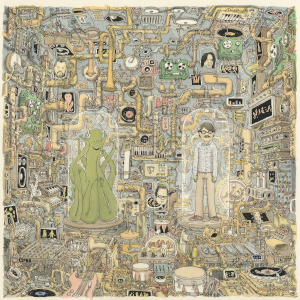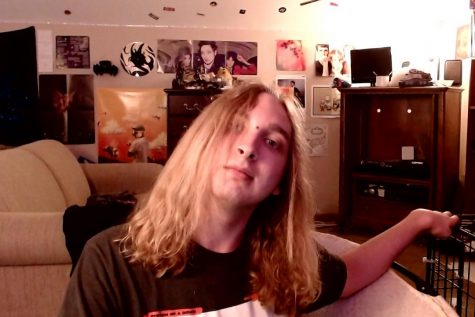Weezer Puts A Twist On Their Old Style On “OK Human”
Weezer, despite being on a bit of a losing streak, seem to have put out one of their best and most theatrical projects in a long time.

February 16, 2021
Despite a critical decline in their music since just before the 2010’s, Weezer has remained one of the most recognizable artists from the 90’s and even early 2000’s. And, although they have been receiving mostly mixed reviews as of late (with some exceptions such as the self-titled White Album), this record seems to be the most “Weezer” Weezer has been in years. In fact, I would even go as far to say that we haven’t seen an album with this genuine quality from the band since their second record, Pinkerton, an album partially responsible for influencing many of the mainstream emo-pop and pop-punk bands of the time, including the likes of Jimmy Eat World and Motion City Soundtrack. Despite this, the record OK Human isn’t really comparable to many of the other projects that Weezer has done in the past. Instead of their rock-influenced approach that they’ve been using since really the beginning, this record goes in a very theatrical and even classically influenced direction a-la bands like AJR, only arguably better than its contemporaries.
This new album genuinely sounds like a soundtrack to a play; an aesthetic that is hard to accomplish, but when done correctly, sounds amazing. Some great examples of this include Jukebox the Ghosts’ Let Live and Let Ghosts, or even Fiona Apple’s Fetch The Bolt Cutters – a record that ended up on the Sandscript’s top albums of 2020. The track that, in my opinion, embodies this energy the most on OK Human is the song “Playing My Piano,” which is so clearly influenced by songs you might have heard on a classic Disney movie it’s almost laughable. If this song is anything, it’s theatrical. The track starts off like a play ballad, with soft and cute strings leading into a slightly ominous sounding piano-lead chorus, before another cute sounding verse. The entire track is, as the title suggests, a song about Rivers’ love for playing his piano. There are lyrics on this track which come off as somewhat cringe-inducing, but still make sense here due to the very clear influence from play soundtracks (“I haven’t washed my hair in three weeks” is actually something Cuomo says on this track, no joke).
Another thing that really stands out on this track as well is its clear references to the Covid-19 pandemic and how it has affected his mental state. There are lines in the lyrics that refer to things like Zoom meetings, which is interesting, considering the creation process of this album. If you’re unfamiliar, this album was almost completely done by the time Weezer was asked to go on tour with the bands Fall Out Boy and Green Day for their over-the-top sounding “Hella Mega Tour.” Weezer postponed this album, however, as it wasn’t really meant to be promoted in the style of a stadium tour, and so they began working on the currently unreleased album Van Weezer, which would then be postponed by the pandemic. Now, this new setting would allow for OK Human to be released. What lines like these would then mean is a possible revision of these tracks in light of the pandemic, and therefore this album could have possibly had an alternate version without the knowledge of the virus – something that would be interesting to see, considering how much influence it takes from it.
This track transitions into what appears to be one of two interludes on this album, “Mirror Image,” which has some of Weezer’s best and most clever writing in a long time. The track has incredibly grand sounding production which eventually fades into what appears to be a studio recording of Rivers. For this last section, he’s singing some incredibly dark and depressing lyrics, especially for Weezer, with lines such as “Heaven can’t help this man, Heaven can’t save this man…,” going on until the track eventually cuts out. In fact, this is the only track on the album that doesn’t transition into the next, most likely to make space for a vinyl version of the record to be flipped. Other than this, every single track somehow plays into the next, with some of the transitions being much more memorable than others.
The first track on this second-half of the record, “Screens,” is a pretty weird song for Weezer, and not necessarily in a good way. This track is a song that appears to be about people being obsessed with technology, which is already kind of common sense, but is also kind of a bad take considering Weezer is the one talking about it. The band’s main success point during their early days was that it coaligned with the increase of usage of computers. Lyrically, early albums like Blue Album and Pinkerton were embracing this nerdy mindset for the time, with clear references to things like Dungeons and Dragons and gaming, which became their main appeal during the 90’s. We even get a return to this mindset on this very record in many of the tracks, so for Weezer to seemingly not address this is pretty weird when some of their most successful records wouldn’t have become mainstream if it wasn’t for the internet.
Speaking of this return to their old sound, the first three tracks really set an old Weezer tone from the very beginning. The opening track, “All My Favorite Songs,” has vocal patterns that scream Blue Album, and “Aloo Gobi” has another vocal pattern that comes off as much more awkward, but in the best way possible, selling the old-Weezer vibe that they were rather clearly going for.
What this album’s biggest selling point is, for me at least, is the use of ballads throughout its duration. “Numbers,” for example, has one of the most lush and gorgeous sounding instrumentals on the record. It starts off with these intense strings similar to the outro to Joji’s song “Ew,” eventually turning into this stunning chorus that wouldn’t sound out of place on any early 2010’s feel-good movie soundtrack (seriously, the fact that this song wasn’t on the soundtrack for Dolphin Tale or something similar is legitimately shocking). The main other ballad on this record, “Bird With A Broken Wing,” is still just as stunning instrumentally, but is kind of lacking on the lyrical side of things. The song is talking from the perspective of, well, its title. The issue here is that it kind of suffers from a very overused style of writing something sad, and starts feeling ingenuine and pretentious almost instantly.
The record starts drifting off for the last two tracks. The first of which is a track titled “Here Comes The Rain,” which may or not be a play on the Beatles song “Here Comes The Sun,” is a fairly upbeat track, but having followed the really dark sounding song “Dead Roses,” it causes this track to lose its happiness, and ends up with it feeling bland. Finally, we get the outro “La Brea Tar Pits,” which doesn’t really seem to do much that the rest of the album hasn’t already done better, and so it doesn’t really feel like it lives up to being the final track on the album, as unfortunate as that is.
In spite of the many clear flaws that are on this project, this album comes very close to becoming what might just be the next classic Weezer album. Plus, it’s also important to remember that part of Weezer’s appeal is their ability to take flaws and make them a key component in what makes the band as unique as they are. Even with these issues that are pretty visible within the album, it doesn’t take away from the experience anywhere near as much as it would another artist, which is honestly impressive in and of itself. I feel like what we’re seeing here might be the start of another great set of records from Weezer, with more introspection and personality than what we’ve gotten to see in a long time.


